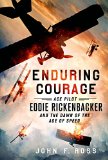Summary | Excerpt | Reviews | Beyond the Book | Readalikes | Genres & Themes | Author Bio

Ace Pilot Eddie Rickenbacker and the Dawn of the Age of Speed
by John F. Ross
Lizzie fell in love with another recent Swiss immigrant, William Rickenbacher, a man with capable hands and a strong back, whose dark, bushy eyebrows seemed to emphasize his fiery spirit. He was stern, in keeping with the Teutonic traditions of men from the cantons of the old country. She thought that he would make a good father for her children. He worked in one of the numerous breweries west of the German Village, which had emerged to slake the thirsts of a hard-toiling immigrant population by fermenting large quantities of cheap, dark ale. The couple married and moved into a cramped space at the back of one such brewery, the reek of hops soon penetrating their few possessions.
The same forces that had opened up Columbus to economic boom brought correspondingly hard times when a chain of recessions struck in the late nineteenth century. Still, the city’s population grew by 70 percent from 1890 to 1900, and another 70 percent between 1900 and 1910. The pioneering Congregationalist preacher Washington Gladden decried the social decay he saw all around him: drunken public officials, prostitutes so thick on High Street in the evening that “decent women” needed an escort. In 1886, four years before the Rickenbachers’ third child and second son, Edward, was born, Samuel Gompers had founded the American Federation of Labor in downtown Columbus to narrow the deep divides between the “masters and men” of the Gilded Age.
Just as his family grew, William was laid off from his brewery job, got another but was laid off again, and had to settle into day labor on the city’s growing infrastructure of bridges and sidewalks. The couple had bought two cheap lots in southern Columbus, several blocks west of the last electric trolley stop, but William’s sporadic employment threatened their dream of someday building a house. They sold one lot to survive.
Without consulting her husband, Lizzie took advantage of her father’s visit to America to borrow his return fare, which she promptly turned into a down payment on another lot and the funds to build a small house with a bedroom and sitting room on the first floor. The children would crowd into an unheated loft to sleep. When she told William that the house was almost complete, he balked, his pride deeply wounded. She told him she was moving there with or without him. Lizzie managed to repay her father by taking on endless loads of laundry. In 1893, when Eddie was three, the young family took up their new residence, which had no gas, let alone electricity, running water, or heat beyond a fireplace, and light only from a single kerosene lamp. Eddie grew up watching his fiercely self-reliant mother doing whatever it took to survive.
His passion for risk taking declared itself early. Human beings exhibit wide ranges of tolerances for danger, from those who recoil from its slightest manifestation through the great majority who live with it uncomfortably and the very few who vigorously seek it. This last response first showed in Eddie as an accident-prone child, starting at four when a streetcar hit him. Over the next several years, he fell into a well and knocked himself out, slipped from a walnut tree, scarring his chin, and had to be rescued by his older brother after getting his foot caught in a railroad track with a train bearing down.
As he grew older, he more actively courted risk. Among his fellow urchins he formed the Horsehead Gang, which took its moniker from the wooden sign of the Columbus Driving Park, a horse-racing track only three blocks away. One Saturday afternoon, the gang commandeered a small square rail truck inside a gravel pit, dragging it up the steep hundred-foot incline to the mine’s stony lip. The boys placed wooden chocks under the wheels, then piled aboard for a number of runs. On the last, Eddie was trying to kick the chock out with one foot when he fell in front of the cart and a wheel cut his shin to the bone.
Excerpted from Enduring Courage by John F Ross. Copyright © 2014 by John F Ross. Excerpted by permission of St. Martin's Press. All rights reserved. No part of this excerpt may be reproduced or reprinted without permission in writing from the publisher.




Music is the pleasure the human mind experiences from counting without being aware that it is counting
Click Here to find out who said this, as well as discovering other famous literary quotes!
Your guide toexceptional books
BookBrowse seeks out and recommends the best in contemporary fiction and nonfiction—books that not only engage and entertain but also deepen our understanding of ourselves and the world around us.